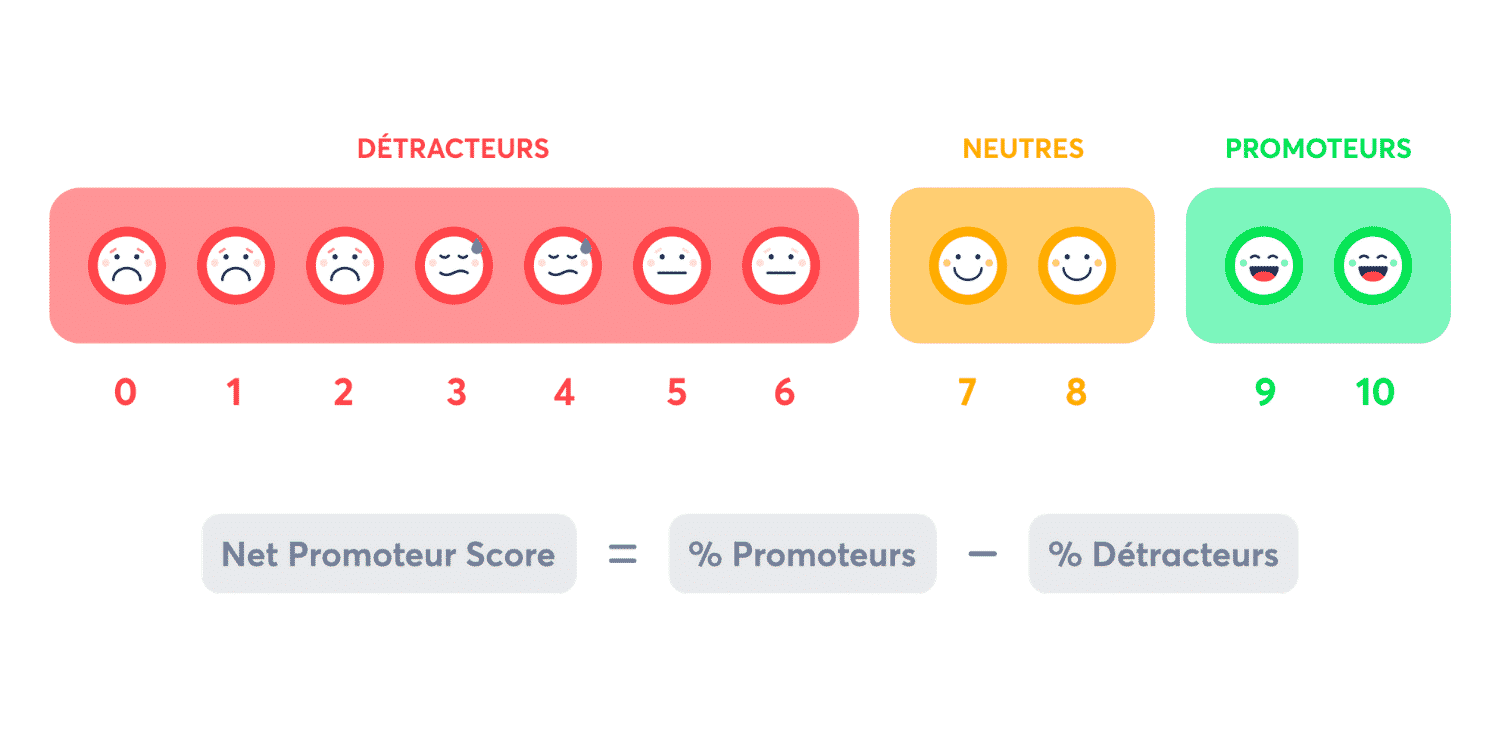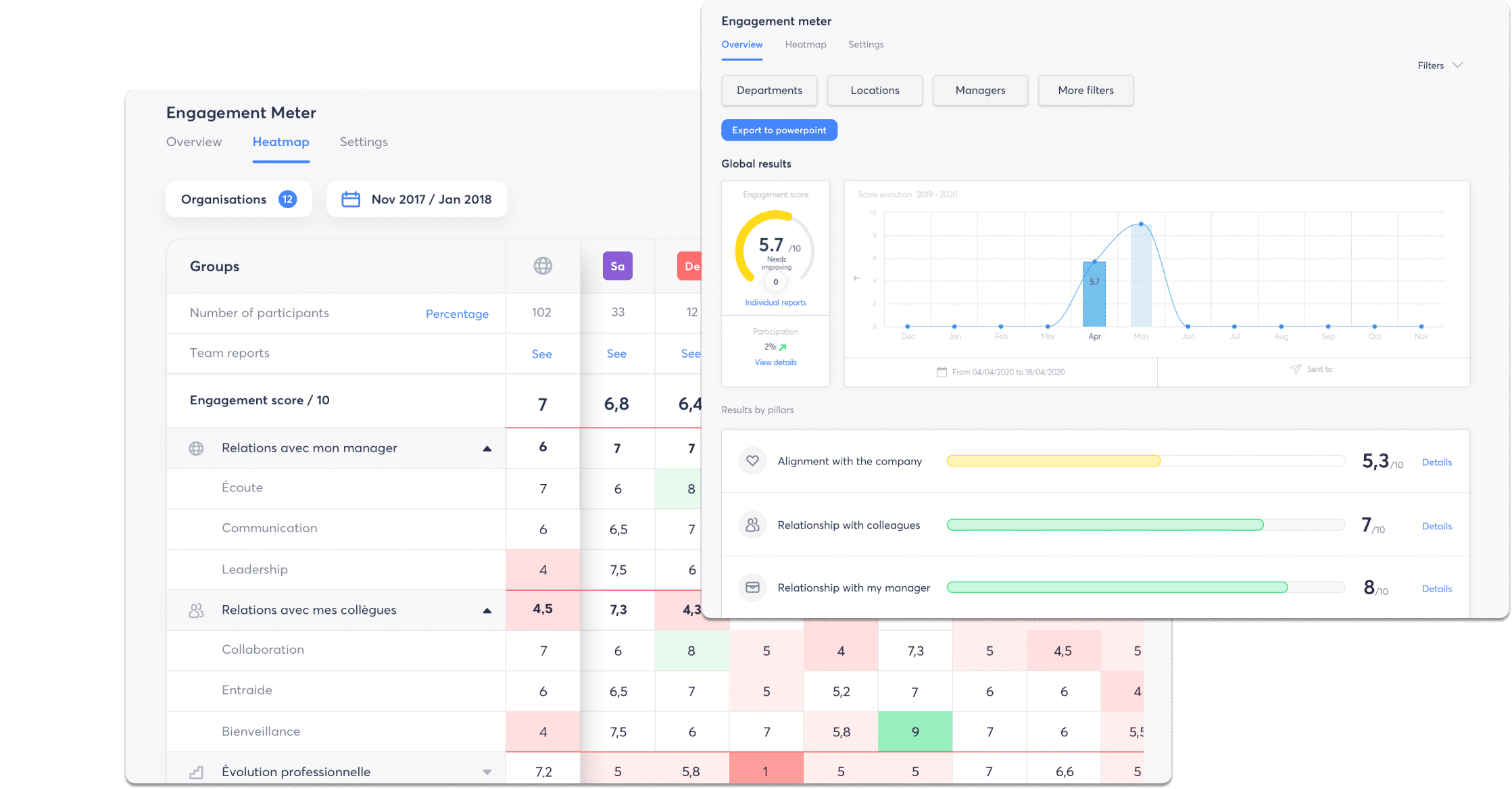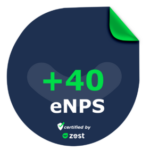What is eNPS?
The eNPS or Employee Net Promoter Score is a key indicator for measuring employee commitment and their propensity to recommend their company.
The concept is directly inspired by a barometer created in 2003 by the consulting firm Bain & Co: the NPS or Net Promoter Score. Designed to measure customer satisfaction, it consists of a single question: “Would you recommend our products/services to people you know?
The eNPS is the equivalent of this barometer, but for measuring employee commitment. Similarly, they are asked a single question:
«Would you advise people you know to come and work for our company? »
The answer is given on a scale from 0 (not at all likely) to 10 (very likely).
This question prompts respondents to evaluate various factors relating to their experience with the company, and the score they give reflects their overall level of commitment and satisfaction.
What does eNPS measure?
The Employee Net Promoter Score (eNPS) is a measure used to assess employee satisfaction and commitment within a company. It is based on the concept of the Net Promoter Score (NPS), which is commonly used to measure customer satisfaction.
Recently, the eNPS methodology has been enhanced to also measure other aspects of employee engagement, such as loyalty, trust in their company’s products or services, and satisfaction, via three additional questions:
✅ Loyalty
If you were offered a position identical to your current one, but in another organization, how likely would you be to stay with your current company?
✅ Confidence
How likely are you to recommend your company’s products or services to friends and family?
✅ Satisfaction
Overall, how satisfied are you with your company?
Companies can decide whether or not to use these three questions in addition to the main question to support the eNPS results. In this case, they will also have to take these answers into account when calculating their engagement score.
What’s the point of using eNPS or NPS?
As a number of studies have shown, engagement boosts team performance. Committed employees are more involved in the life of the company, generating better results and reducing turnover within organizations.
Here are a few figures that speak for themselves:
- 3 out of 4 employees have little or no commitment (worldwide)
- The cost of disengagement is €12,600 per year per employee
- 19% of employees quit when they don’t feel listened to within their company
- 27% is the low rate of employee engagement when their managers don’t deal with the issues that are important to them.
- But this rate rises to 63% when managers take action based on the results of employee surveys.
Measuring your employees’ level of commitment is therefore important, and eNPS can give you a good overview.
How to calculate eNPS?
✅ Setting up an eNPS questionnaire
Now’s the time to try answering that famous question: “On a scale of 0 to 10, how highly would you recommend our company as an employer?”
✅ Categorize answers
It’s now time to divide the answers to the eNPS questions into three categories:
-
- Promoters: score 9-10
These are the employees who give the best marks. They are considered highly committed and are ambassadors for your organization.
-
- Neutral: score 7-8
Even if these employees don’t really have a negative opinion of their experience at the company, they’re not really committed either.
-
- Detractors: score 0-6
These are the people who gave the lowest marks to the eNPS questions. These employees are clearly disengaged.
✅ Calculate eNPS
The formula to be used to calculate your score is as follows:
eNPS = % Promoters – % Detractors
For example, if a company has: 70% promoters, 5% neutrals and 25% detractors, its eNPS score is: 70 – 25 = 45
✅ Interpreting the score

The NPS® scale ranges from 100 (a perfect score with 100% promoters) to -100 (the worst-case scenario with 100% detractors). Any score above 0 is considered satisfactory, as it means that your company has more promoters than detractors. Any score above 25 is considered very satisfactory, and any score above 50 is exceptional.
✅ Improve your eNPS
eNPS alone is not enough…
As you can see, the eNPS only provides a snapshot of the current situation, and in no way identifies areas for improvement. It is therefore important to go beyond this result by offering a more comprehensive measure of your employees’ engagement.
Zest’s Engagement Meter divides engagement factors into six simple categories, which your employees rate and comment on. It thus identifies the values that are important to your employees, thanks to 18 “motivational levers” defined by a doctor of psychometry.
Surveys can also be used at company level, or even within a single department, to invite employees to give their opinion on one or more themes.
💡 Discover Zest’s engageometer and “Listen” pillar.

Our expert’s advice and PhD:
It’s essential to go beyond simply measuring engagement, and turn it into concrete action. To do this, you need to identify the values that motivate your employees and activate these levers to improve well-being at work.
Enhance your eNPS score
The eNPS score is an undeniable element of reassurance to reinforce your employer brand with your customers, employees and future recruits. Zest has created its own eNPS Label to give companies a tangible indication of their commitment to their employees. These scores are calculated directly from an engageometer or survey, according to the needs of the organization.
The benefits of eNPS
The Employee Net Promoter Score (eNPS) offers a number of advantages for companies. Here are some of the main benefits of eNPS:
- Simple, easy-to-understand measurement : The eNPS is based on a simple question to ask employees, making it easy to understand and implement. Scores are also easy to interpret, enabling companies to quickly obtain an overall measure of employee satisfaction and engagement.
- Employee satisfaction indicator : eNPS provides a measure of employee satisfaction that can be tracked over time. This enables companies to detect trends and developments in employee satisfaction, highlight potential areas of concern, and assess the effectiveness of initiatives taken to improve the employee experience.
- Predictability of employee engagement : Studies have shown that eNPS is linked to employee engagement. A high eNPS score is generally associated with a higher level of engagement, which can have a positive impact on productivity, employee retention and customer satisfaction.
- Identifying areas for improvement : Complementing the main eNPS question, additional employee feedback can help identify specific issues and potential areas for improvement. This enables companies to focus their efforts on improving the employee experience, reinforcing corporate culture and fostering a positive working environment.
- Easier comparison and benchmarking: eNPS can be used to compare employee satisfaction between different departments, teams or even with other companies in the same sector. This enables companies to benchmark themselves against their peers and identify best practices to adopt.
- Employee retention tool : By identifying dissatisfied employees and detractors, eNPS can help prevent departures and implement corrective actions to improve satisfaction and engagement. By taking action to address employee concerns, companies can strengthen talent loyalty and reduce turnover.
The limits of eNPS
Due to the simplicity of its approach and use, the eNPS has certain limitations that need to be taken into account when applying it:
- A simple observation at a given moment T : The eNPS score is limited to assigning a result, without going into the causes and means of action to be activated to improve the score. The score is simple and does not take into account the complexity of the factors and emotions involved.
- Lack of analytical finesse : the underlying reasons for the score and the causes of satisfaction or dissatisfaction are not addressed. Understanding the reasons for positive or negative appraisal is essential to gain a comprehensive view of employees’ state of mind and perception of their organization.
- Lack of action plans : Zest’s philosophy of continuous improvement means that means must be put in place to deal with dissatisfaction, such as 1:1 rituals, OKRs or continuous conversation, which is not provided for in the eNPS framework.
For a more accurate picture of employee satisfaction and commitment, we recommend combining eNPS with other assessment tools, such as qualitative surveys, polls, individual interviews and corporate culture assessments.
Going beyond eNPS
To take things a step further, there are a number of solutions available, depending on your needs:
- Gather employee opinions quickly: Think about regular surveys and Pulse surveys: while eNPS enables you to take the temperature of your teams at a given moment, surveys facilitate a more precise, long-term vision, all in just a few clicks.
- Measure your company’s social climate: Zest’s social barometer enables you to measure your employees’ well-being, assess their commitment and parameterize your HR surveys, while tracking your progress.
- Globalize your surveys: Our tool enables you to boost your employee experience globally and consistently.





